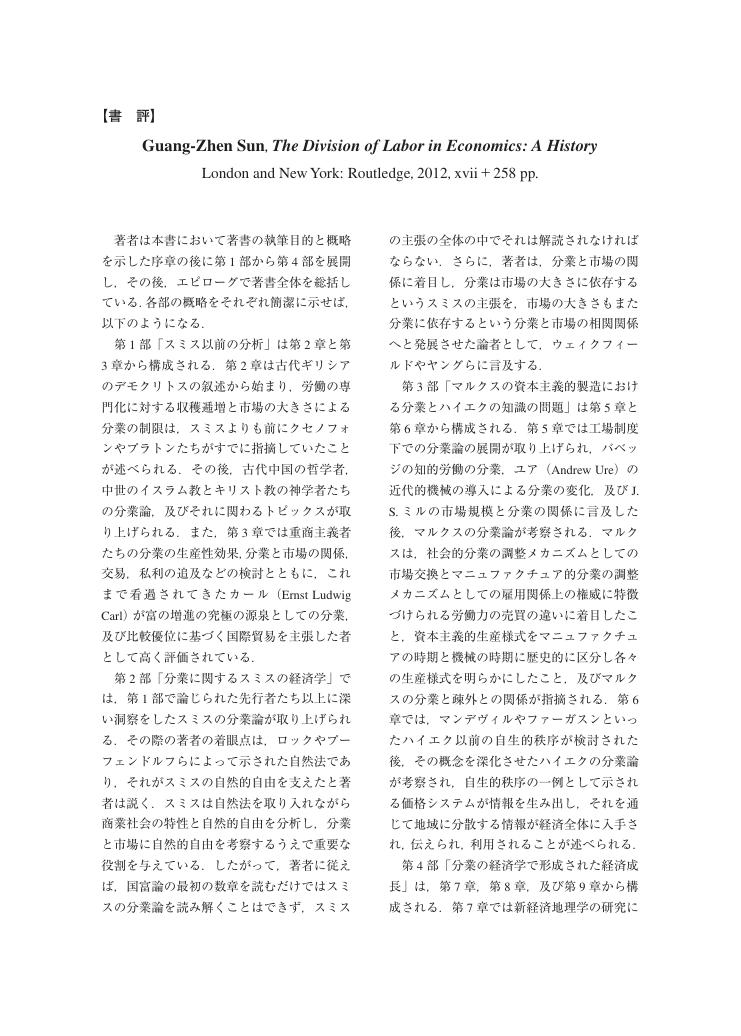2 0 0 0 中国企業組織の従業員の権威勾配
- 著者
- 古澤 照幸 張 英莉 村田 和博 平野 賢哉
- 出版者
- 埼玉学園大学
- 雑誌
- 埼玉学園大学紀要. 経営学部篇 (ISSN:13470523)
- 巻号頁・発行日
- vol.11, pp.39-49, 2011-12
中国の裁判所と保険会社の2組織の従業員に権威に関する調査を実施した。権威についてどのようにとらえているか、上司と部下との間の権威の関係である権威勾配、上司や組織への忠誠心などを質問紙によって調査を行った。上司が威圧的であるととらえる者ほど(権威勾配が急であるほど)、面従腹背の傾向が強く、組織や上司への忠誠心が低いことがわかった。日系企業の現地化の際の「二重構造」の問題を権威勾配と関係付けて議論した。
- 著者
- 村田 和博
- 出版者
- 経済学史学会
- 雑誌
- 経済学史研究 (ISSN:18803164)
- 巻号頁・発行日
- vol.56, no.2, pp.135-136, 2015 (Released:2019-11-30)
1 0 0 0 OA J. S. ミルにおける企業分析とアソシエーション
- 著者
- 村田 和博
- 出版者
- The Japanease Society for the History of Economic Thought
- 雑誌
- 経済学史研究 (ISSN:18803164)
- 巻号頁・発行日
- vol.49, no.1, pp.53-68, 2007-06-30 (Released:2010-08-05)
- 参考文献数
- 56
John Stuart Mill was strongly influenced by Charles Babbage in his analysis of the firm. However, research has not yet fully clarified the relationship between Mill and Babbage. The purpose of this paper is to point out features of Mill's thought on management through a contrast with Babbage's analysis of the company.When Mill made his analysis of the firm, he applied to it his own original perspective and ideas, while drawing on what he learned from Babbage. First, he attempted to demonstrate that an administrator's management capability and efforts created a difference in profits through “wages of superintendence, ” which was one component profit. Second, in evaluating the appropriateness of introducing limited liability, he not only looked at the issue of creditor protection but also considered the promotion of the establishment of associations. Third, he showed that cooperation was a factor that could lead to increases in the efficiency of an organization. Since humans have an innate desire to be in unity with our fellow creatures, we have an inherent capability for cooperation. However, in order to strengthen this capability, activities must be carried out in an association, the locus for independent workers to pursue profit of the whole based on their own judgments. Unlike Babbage, Mill believed it indispensable that independent individuals cultivate their humanity through cooperation. It is likely that on this point, he did not easily accept Babbage's approach, which was based on ideas of scientific management.
1 0 0 0 OA C. I. バーナードとE. C. ウェイクフィールドの協働論
- 著者
- 村田 和博 Kazuhiro MURATA
- 出版者
- 埼玉学園大学
- 雑誌
- 埼玉学園大学紀要. 経営学部篇 = Bulletin of Saitama Gakuen University. Faculty of Management (ISSN:13470523)
- 巻号頁・発行日
- vol.10, pp.1-14, 2010-12-01
